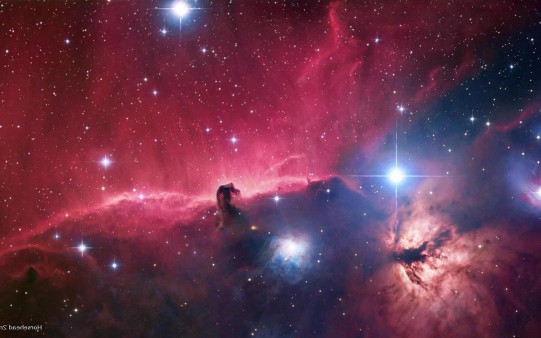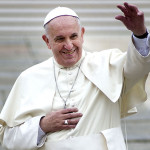Cosmology and Creation: Contrasting Notions
by Fr. Andrew Pinsent
Filed under Cosmology, The Existence of God
NOTE: Yesterday we shared a guest post on cosmology from one of our top non-theistic commenters, Paul Rimmer. Today, we're posting a response from Fr. Andrew Pinsent, Research Director at Oxford University's Ian Ramsey Centre for Science and Religion.
As a Catholic priest, and former particle physicist at CERN, I thank Strange Notions for the opportunity to respond to Paul Rimmer’s article on the Big Bang. For those hoping for instant controversy, I am sorry to have to say that I agree with much of what he says and would even like to bolster his arguments a little in regard to the Kalām cosmological argument.
If we think of time like a line in space—a popular, though probably fallacious, modern assumption—the Big Bang offers alternatives to inferring that the line comes to an end: perhaps the cosmos does not shrink to zero (after all, we cannot see directly beyond the ‘optical horizon’ of the Big Bang, the cosmic microwave background); or perhaps the observable cosmos is part of a larger, invisible, and eternal physical reality (a multiverse?); or, more exotically, as various physicists have suggested, space and time might form an integrated whole that is bounded without an edge, like the surface of the earth that one can walk on forever without finding an edge.
Alternatively, if we think of time in more philosophical manner, it seems clear that we measure the passing of time in terms of motion from place to place in respect of some magnitude, such as the hands of a clock against a background. In the case of the Big Bang, however, all conceivable clocks go with us into the singularity, and there is no clock ‘outside’ the cosmos. Hence we cannot say that the cosmos ‘begins’ with respect to some extra-cosmic temporal reference, a point essentially made by St. Augustine over fifteen centuries ago in his Confessions, 11.13: “For you [God] made time itself, and periods could not pass by before you made the whole temporal procession.”
Finally, the notion of absolute time is not even meaningful within the cosmos. The speed of light is constant, but according to relativity, distances and durations vary between reference frames. If you could ride the cosmic background radiation of the Big Bang to our instruments on earth today, you would experience no passage of time, and, since light is also part of the cosmos (and arguably more fundamental than space and time), in what sense can we say the cosmos begins?
Nevertheless, what is curious about the historical reception of this theory, later called the ‘Big Bang’ by one of its fiercest critics, is that many contemporaries perceived that it did have theological significance. Rimmer cites the case of Pope Pius XII being a little too enthusiastic in 1951, and being corrected by Fr. Lemaître (an interesting dynamic for those who imagine that the Church is a place deficient in freedom of thought). What most people do not know today, however, is that the theory was frequently attacked as repulsive and effectively banned from official consideration in the Soviet Union for over three decades. In Helge Kragh's book, Cosmology and Controversy (Princeton University Press, 1996, p.262), he cites the case of Soviet astronomers, at a meeting in Leningrad in December 1948, affirming the need to fight against this “reactionary-idealistic ‘theory’” which, they claimed, helps clericalism.
So why did the representatives of societies holding diametrically opposed views about the existence of God react in such diametrically opposed (but inverted) ways to the Big Bang, at least for the first few decades? The reason, I suggest, is not to be found in any kind of ‘God of the gaps’ argument that makes God a cause among causes, whether the ‘gap’ in question is a temporal beginning or, more recently, the divine composer of the incredibly fine-tuned settings of the physical parameters of modern Big Bang cosmology. As it happens, fine-tuning is an ongoing issue, as theoretical physicist Lee Smolin explains in The Trouble with Physics (Houghton Mifflin Harcourt, 2006). Moreover, at least some proposals for a multiverse of largely lifeless cosmoi, as ways of absorbing the failures of random trials, make certain fine-tuning problems worse (cf. R.D. Holder, God, the Multiverse, and Everything: Modern Cosmology and the Argument from Design (Ashgate, 2004, esp. ch. 3 and 4). In the early years, however, the fine-tuning problem was not prominent and there was already some appreciation of the subtlety of the notion of time in this new cosmology.
A more likely explanation for the diverging reception of the Big Bang is be found, I think, in its challenge to the established cosmic parable, or grand narrative, or “interpretative framework by which nature may be ‘seen’" (cf. Alister McGrath, A Fine-Tuned Universe: The Quest for God in Science and Theology; the 2009 Gifford lectures (Westminster John Knox Press, 2009, x).
Since we have become accustomed to the Big Bang, it is easy to forget the initial shock of this proposal to the seeming permanence of the heavens. With the Big Bang, the observable cosmos is not an eternal given, but exploded as if out of a point in a flash of light, a narrative consistent with theistic drama on the grandest scale.
In addition, the narrative of an ever-decreasing number of ever-more powerful causes (a kind of ‘cause funnel’), a way of thinking about the world inherited from the ancient Greeks (cf. Aristotle, Metaphysics, 1.1) and mutually reinforced by theism for two thousand years, has been powerfully reinforced again by the Big Bang on a cosmic scale and time (incidentally and quietly undermining a Humean skeptical stance towards knowledge of remote causation).
Finally, since we now think of the time, space, and matter of the observable cosmos as a dependent reality, interest has focused on the inference of primordial causes or of a first cause beyond the observable cosmos. Hence it is not surprising that avowedly atheist interpreters of cosmology have tended to become comfortable with the Big Bang only since starting to offer stories about alternative, invisible, all-powerful, and eternal first causes to the God of theism. Although such stories use scientific language and impressive mathematics, they often take a lamentably cavalier and unreflective attitude to long-standing philosophical questions, such as how a law can create anything, where matter comes from, and whether we are really justified in turning time into a dimension of space. What such stories seem to accept implicitly, however, is the need for some kind of first cause. Hence in regard to interpretations of the Big Bang, as in many other debates about the philosophy of the world, the real issue may not be the existence of ‘God’ but what ‘God’ is.
Related Posts
Note: Our goal is to cultivate serious and respectful dialogue. While it's OK to disagree—even encouraged!—any snarky, offensive, or off-topic comments will be deleted. Before commenting please read the Commenting Rules and Tips. If you're having trouble commenting, read the Commenting Instructions.













